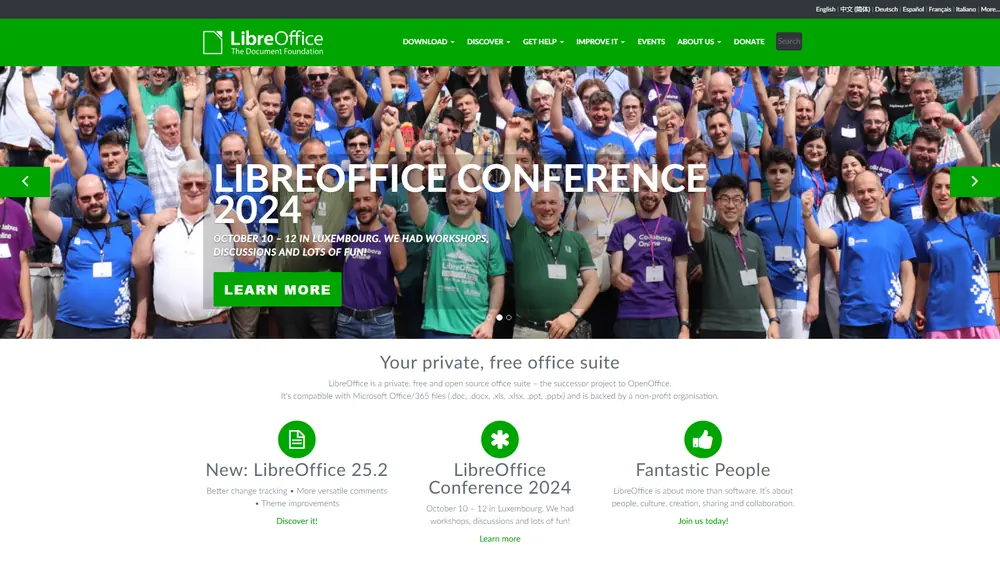LibreOffice(LibreOffice Online) Overview & 2025 Industry Position
Originally known for its robust, open-source desktop productivity suite, LibreOffice has now firmly positioned itself in the browser-based collaboration space with LibreOffice(LibreOffice Online). By 2025, the platform stands as a key alternative to proprietary office tools, especially for enterprises and SMBs prioritizing privacy, open formats, and cost control.
LibreOffice Online leverages the same open document engine as its desktop counterpart but adds real-time editing, multi-user collaboration, and deployment flexibility — from self-hosted servers to cloud-native environments. As digital sovereignty and data compliance rise in focus, LibreOffice Online increasingly attracts governments, universities, and enterprise IT teams seeking open control over their document workflows.
From Launch to 2025: LibreOffice(LibreOffice Online)’s Journey
The LibreOffice project began in 2010 as a fork of OpenOffice.org, with the goal of creating a fully free productivity suite independent of corporate influence. Over the years, it introduced enhanced compatibility with Microsoft formats, a robust scripting engine, and UI refinement with the Notebookbar interface.
- 2011: First official LibreOffice release (v3.3)
- 2016: LibreOffice Online preview launched with Collabora partnership
- 2018: Document Foundation formalizes Online strategy via Nextcloud and ownCloud integrations
- 2021: Major UX improvements, including mobile optimization
- 2023: Better font rendering and track changes for web collaboration
- 2025: Implements OpenDocument v1.4 full compliance and hybrid deployment for public sector contracts
In 2025, the platform’s vision centers on open productivity for compliant and cost-conscious digital ecosystems, especially within education, non-profit, and regulated international markets.

LibreOffice(LibreOffice Online) Key Features
The online suite packs in nearly the full range of desktop functionality — right in your browser — making it ideal for institutional and remote team setups:
- LibreOffice Writer Online: Full-featured word processor supporting styles, mail merge, citations
- Calc Online: Spreadsheet editor with macros, pivot tables, and extensive formula support
- Impress Online: Collaborative slideshow creation and editing with animation previews
- ODF 1.4 compliance: Native support for open formats ensures long-term data portability
- Deployment flexibility: Host on your own server (Docker, Kubernetes), or use with a partner like Collabora
- Multi-language support: Available in 100+ languages, optimized for RTL and complex scripts
Workflow & UX
LibreOffice Online offers an intuitive, ribbon-style interface that mirrors its desktop equivalent. Thanks to Nextcloud or ownCloud integration, users can edit directly from synced file shares, with changes autosaved and versioned.
Key UX strengths include:
- Clear toolbar layouts adapted for each app (Writer, Calc, Impress)
- Cross-platform rendering consistency (Chromebooks, tablets, Linux thin clients)
- Mouseover tips and drop-down quick menus
- Fast keyboard shortcut support for power editors
LibreOffice(LibreOffice Online) Pricing Analysis & Value Metrics
LibreOffice Online is open-source at its core, but in practical use, deployment includes additional layers (e.g. Collabora Online, storage platforms). Below is a snapshot of common set-ups in July 2025:
| Model | Cost (monthly) | Includes | Target User |
|---|---|---|---|
| Self-Hosted (Direct) | $0 | LibreOffice Online server, community support | Tech-savvy orgs |
| Collabora Cloud Pro | $5/user | Commercial updates, SLA, browser access | Businesses, Education |
| Managed Private Instance | $20+/user | Hosted instance, support, backups | Enterprises, Public Sector |
Value Verdict: Outstanding for FOSS-aligned ecosystems; unbeatable TCO for document-heavy workflows if deployment costs are amortized efficiently.
Competitive Landscape
| Platform | Strengths | Limitations |
|---|---|---|
| Google Workspace | Best real-time collab; cloud-native | Privacy; no on-prem hosting |
| Microsoft Office 365 | Power features; deep integrations | Subscription cost; proprietary formats |
| LibreOffice(LibreOffice Online) | Open-source; self-hostable; ODF-native | UI polish; mobile editing less fluid |
| OnlyOffice | Nice UX; Office format fidelity | Weaker spreadsheet engine |
Use Cases & Applications
- Educational institutions: Deploy server-based collaboration for students and faculty
- Government & NGOs: Maintain open-standard compliance and data sovereignty
- Remote SMBs: Use free or low-cost document infrastructure with secure access layer
- Technical teams: Integrate ODF-support into DevOps, automation workflows
Integrations & Working Environments
LibreOffice Online integrates well with several key service platforms:
- ownCloud/Nextcloud: Embedded editing with secure team access
- Collabora Office: Commerical version with REST API compatibility
- LDAP & OAuth: SSO-ready for enterprise-grade deployments
- External storage: Connects to SharePoint, WebDAV, S3 (via vendors)
Pros & Cons
- Pros:
- Zero license cost for core package
- Open standards and data freedom
- Enterprise-ready private deployment options
- Available in 150+ languages
- Cons:
- Can be less intuitive for non-technical users
- Requires IT expertise for optimal installation
- Fewer integrations than big tech options
Final Thoughts
Whether you’re a privacy-conscious academic institution or a lean business avoiding vendor lock-in, LibreOffice Online offers solid functionality at an unbeatable price point — especially in 2025’s intensifying SaaS fatigue. It’s not the flashiest, but its openness, flexibility, and feature mirroring of desktop productivity tools make it a smart and sovereign platform choice.
Pro Tip: Pair LibreOffice Online with Nextcloud for the most unified, self-hosted document collaboration experience.
LibreOffice(LibreOffice Online) FAQ
Yes. LibreOffice Online is free when self-hosted, following open-source licensing. Commercial support and hosting may carry costs.
Yes, but the UX is optimized more for tablets and larger screens. Mobile editing is possible but may feel constrained.
For DIY organizations, Docker or Kubernetes orchestration; for teams without IT staff, Collabora-hosted services are recommended.
Yes. You can open, edit, and save DOCX, XLSX, and PPTX formats, though some advanced layout fidelity may vary.
For community editions, support comes via forums. For commercial versions, SLA-based support is provided by vendors like Collabora.